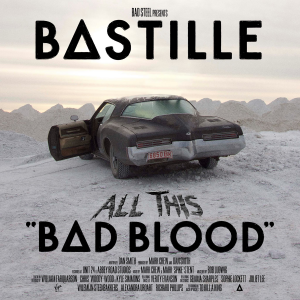Mixing melancholy lyrics and upbeat instrumentals, acoustics and synths, the British alternative rock band creates a catchy yet meaningful album.
[soundcloud url=”https://api.soundcloud.com/tracks/110969844″ width=”100%” height=”166″ iframe=”true” /]

I can’t speak for everyone when I say this, but songs about destroyed cities and scarring losses aren’t really what come to mind when I’m searching for pump-up music I can dance to. Bastille’s “All This Bad Blood” just might change that.
After being certified platinum following the band’s United Kingdom release in March 2013, Bastille’s debut studio album “Bad Blood” officially extended its reach to American audiences on Nov. 25 when it released the extended United States version “All This Bad Blood.” Despite a few blunders, the album demonstrates Bastille’s wide technical range through its successful experimentation with opposing musical elements.
The album opens with the band’s best-selling single “Pompeii,” which references the burial of the ancient Roman city of the same name after the disastrous eruption of Mount Vesuvius in AD 79. The track begins with male choral chants that occasionally overpower the lead vocals. At certain points, this makes it hard to hear and understand the descriptive — albeit a little repetitive — lyrics. However, the use of these distinctly low and powerful backing vocals in addition to the guiding percussion creates a fuller sound. In fact, the overwhelming build up makes it sound as if you’re listening to a live performance.
That being said, the key element to this song’s success is the manner in which the band conveys pessimistic ideas (“How am I gonna be an optimist about this? / If you close your eyes / Oh where do we begin? / The rubble or our sins?”) through buoyant instrumentals without appearing forced or inappropriate. This technique is used again in “Things We Lost in the Fire,” a song about shattered relationships, which sounds downbeat for the first few seconds but quickly picks up when cheery pizzicato strings lead the listener to the pop-like chorus. “Weight of Living, Pt. II” also contrasts the stark realities of life (“And you’ll be old soon, you’ll be old / Do you like the person you’ve become?”) with a more psychedelic sound, incorporating upbeat electronic effects that surprisingly complement the otherwise acoustic feel of the album as a whole.
[soundcloud url=”https://api.soundcloud.com/tracks/102282700″ width=”100%” height=”166″ iframe=”true” /]
Still, not every song is as multi-dimensional. “Daniel in the Den” and “Icarus” sound like any other alternative rock song, and tracks like “Overjoyed” and “Oblivion” serve as beautiful ballads on their own but are rather unmemorable in comparison to the rest of the album due to expected instrumental riffs. Tunes like these do however help prove that lead vocalist Dan Smith, though not all that original in tone, is undeniably talented. His dynamic voice lends to the naturally wispy yet rich, controlled yet spontaneous feel of the album.
Bastille manages to mix elements of various genres of music, from pop to indie rock, giving the band an original sound that’s difficult to label. Contrary to the title, “All This Bad Blood” has definitely marked Bastille as a force to be reckoned with in the music industry for its unique approach at tackling darker themes through an upbeat framework.







